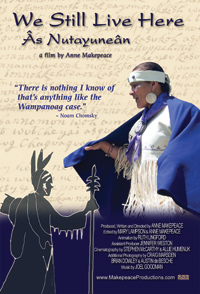
At MIT this Thursday, there will be a screening of the film We Still Live Here (Âs Nutayuneân):
Date/Time: Thursday, Nov 17, 7:00pm
Location: 1-190
Celebrated every Thanksgiving as the Indians who saved the Pilgrims from starvation, and then largely forgotten, the Wampanoag Tribes of Cape Cod and Martha’s Vineyard are now saying loud and clear, and in their Native tongue, “Âs Nutayuneân,”—We Still Live Here. The Wampanoag’s ancestors ensured the survival of the first English settlers in America, and lived to regret it. Now a cultural revival is taking place. Spurred on by their celebrated linguist, Jessie Little Doe Baird, recent winner of a MacArthur ‘genius’ award, the Wampanoag are bringing their language home. Like many Native American stories, this one begins with a vision. Years ago, Jessie began having recurring dreams: familiar-looking people from another time speaking in an incomprehensible language. These visions sent her on an odyssey that would uncover hundreds of documents written in Wampanoag, lead her to a Masters in Linguistics at MIT, and result in an unprecedented feat of language reclamation by her people. Jessie’s daughter Mae is the first Native speaker of Wampanoag in a century.
Jessie Little Doe Baird received her S.M. degree from this department in 2000, where her advisor was the legendary late Ken Hale. We wrote about Jessie on the occasion of her MacArthur award in 2010, where we also noted our colleague Norvin Richards’ role in continuing Ken’s contributions to the Wôpanâak Language Reclamation Project.
After the screening, Jessie and Norvin will be joined in a discussion and question & answer session by film maker Anne Makepeace, and by Nitana Hicks (S.M. Linguistics, 2006), another member of the Mashpee Wampanoag involved in the reclamation effort.
Cosponsored by MIT Program in Women’s and Gender Studies, Women in Film and Video/New England, The Technology and Culture Forum, The Office of Minority Education, The Office of Student Activities and MIT Linguistics.